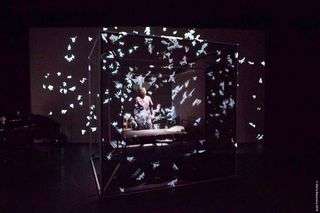|
Back
The Moth Of Us All New York
Baruch Performing Arts Center
01/10/2018 - & January 12, 13, 18, 19, 20, 2018
Mikael Karlsson: The Echo Drift (orch. Mikael Karlsson and Michael P. Atkinson)
Blythe Gaissert (Walker Loats), John Kelly (Governor and The Moth)
International Contemporary Ensemble (ICE), Aaron Likness (Pianist), Nicholas DeMaison (Conductor)
Mallory Catlett (Director), Elle Kunnos de Voss (Environment Design/Drawings), Simon Harding (Projection Design), Christopher Kuhl (Lighting Design), Andrea Mincic (Costume and Prop Design), Dara Hamidi (Animations)

J.Kelly/B.Gaissert (© Dargelos/Taylor Hooper)
“...And I despise your books, I despise wisdom and the blessings of this world. It is all worthless, fleeting, illusory, and deceptive, like a mirage. You may be proud, wise, and fine, but death will wipe you off the face of the earth as though you were no more than mice burrowing under the floor, and your posterity, your history, your immortal geniuses will burn or freeze together with the earthly globe...”
Anton Chekhov: The Wager
Anton Chekhov tells of a young lawyer who, for a bet, is sealed up in a house for five or ten years. He can write, smoke, play the piano, drink wine. The wager is whether the isolation will destroy him. The opposite is true. And as the years go by, he gives up on all of this. When freed, he refuses the money with the words above, that all earthly matters are foolish. (It’s far more complicated than that, but leave it be...) This was Chekhov’s most serious, most cryptic story, and one that transcends his importance at a story-teller.
It might be possible to imagine an opera from this, but his words were far more indispensable than music. That, though, was not the way librettists Elle Kunnos de Voss and Kathryn Walat saw The Echo Drift. In this production from the always innovative, always original Prototype Productions (commissioned, developed and produced by Beth Morrison Projects, HERE, and American Opera Projects), instead of lawyer volunteering to be secluded, we have one woman named Walker Loats who, when we find her, is shut up for life in a maximum security prison, “The Hersh.” More than that, she has no windows, no doors and–most essential–no way of deciphering time. No clocks or watches.
When we see her, she is constructing her own clock, but that clock does little. And she, in a 70-minute monodrama, not only moans about her fate, not only sings about her philosophical dilemma, but in her–possible–mania, she finds a friend.
The friend is a moth. Or, to be more formal, Moth. A special moth with an equal interest in quantum theories of meditation, eternity, the limits of space and duration (a post-Einsteinian moth, to be certain). Moth also has the power to flutter and float big and small, speak the plummiest British accent and–like those damned moths which used to eat my sweater–multiply into thousands of other moths, as seen in the picture below.
In a command quite unsuited for somebody serving time in prison without parole, Moth tells Walker Loats, “You have to let go of time.” And while she should affirm this, she keeps rebuilding her do-it-yourself clock, writing endless letters to the Governor of the prison (who finally shows up, and who is actually the Moth himself). We learn of the story behind the imprisonment, and we begin to understand the titular “Echo Drift”, which is time and memory together. A mythical place which doesn’t sound terribly appealing.
Marcel Proust did the same thing, but he had people and music and salons and beaches and paintings and all the paraphernalia which makes time and memory so vital.
Now I am a thousand-percent in favor of operatic symbolism, whether in Mozart or Monteverdi. And am equally happy with W.H. Auden’s maxim that “no good opera can be sensible since people do not sing when they are sensible.” Yet the quiet mania of the girl here, as well as the patronizing certitude of the Moth himself, began to grate on me far too quickly.
If the words, in fact, floated the theories of Leibniz, Wittgenstein and Stephen Hawking, the singing, the dark stuttering orchestration and the amazing special effects, quickly evaporated the ideas. Like the Moth, they were large and small, they broached endless ideas about Mind, Body and universes. But the main idea, like an echo from the simple language of various New Guinea tribes–was that we have only “Now” and “Not Now.”
And amen to all that.

B.Gaissart, J.Kelly with plague of moths (© Baranova)
What could not be avoided were the production values of this intense monodrama. Beginning with mezzo-soprano Blythe Gaissart. She is a splendid actress, and her singing was clear, her lines, very much like in Schoenberg’s Erwartung, rang with emotion, meanderings, and serious contemplation. Her Moth/Governor partner, John Kelly, spoke rather than sung, but his was the voice of reason, the soothing accents of a classroom teacher, rather than a Solon.
The visuals of this production more than made up for the amorphous message. First was a cubistic set. The first cube, the austere prison itself, with a bed, a table, a prisoner. (It reminded me of the similarly stark room for Marcel Proust at the Alliance Française this week.) The prison cube was inside another movable cube open on three sides, the fourth for projections. That cube could be maneuvered, turned around easily, though its purpose was not quite clear
Most of the amazing visuals were for this lunar moth, floating on all sides, coming close to the audience, flying away, prognosticating somehow. Yes, Moth was nothing more than a mobile Rorschach Test inkblot, yet quite endearing.
But the start of The Echo Drift, designed by Projection Designer Simon Harding, was awe-inspiring. Holographic black-and-white blueprints of a street and a city flying by, in different dimension. It was a visual tour de force, and while unclear of its purpose (probably time and memory), still memorable.
This was, though, an opera. The International Contemporary Ensemble, led by Nicholas DeMaison, was orchestrated for the darkness of the tale. No violins or violas: a single cello, bass, clarinet, bassoon, harp, and saxophone, along with piano. When necessary, they produced vibrating chords, at times gave Schoenbergian ostinatos to Ms. Gaissert’ singing.
I only wish I’d had a libretto to study before the opera, to make a logical sense of the meandering cerebrations of the prisoner. Without it, at the very end, I had to echo the words of a person to my left in the theater.
Said she to her companion in either a description of the theme or exhaustion after 70 minutes. “It’s about time.”
Harry Rolnick
|